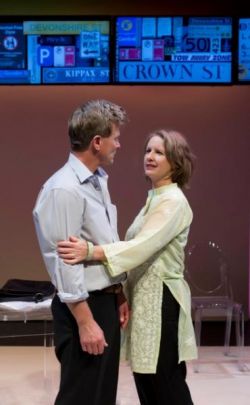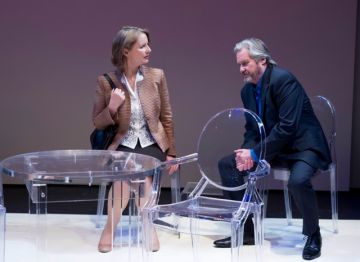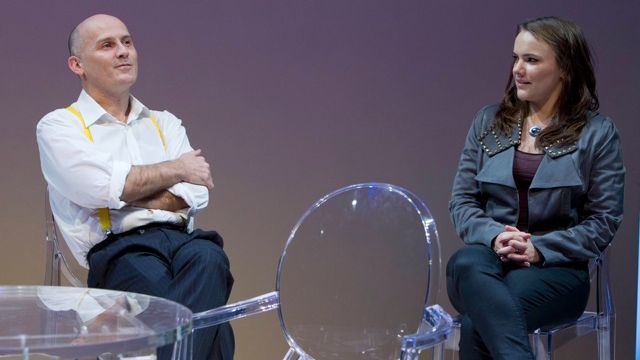Happiness
Sandra Bates has directed this latest of David Williamson’s vignettes on middle class Australia with her usual sensitivity to the style and tempo of his writing. Scene changes are fast and seamless, carefully choreographed to sustain the momentum that is so essential to Williamson’s take on social satire. Characters are established quickly and move through momentary light fades on a minimalist set that becomes office, home, café or bar as the scenes demand.
In this play Williamson concentrates on … guess what … relationships! This time he uses the current obsession with ‘well being’ (ie ‘happiness’) as his starting point. There are the usual passing cracks at politics and the economy, but the play revolves around the frailty of relationships based on superficiality and deceit.
Roland (Mark Lee) is running a ‘Wellbeing’ course – think ‘Landmark’ and the like – that aim to help people find ‘happiness’. He pushes the usual hype of confronting underlying impediments to personal wellbeing by writing letters to assuage guilt – some kept, some sent! And the recipient of this advice – providing the basis of the plot – is his journalist daughter, Zelda (Erica Lovell) who is basically unhappy on most levels, except for her relationship with him.
 Roland is a kind man, but he isn’t really happy himself, and the main reason for this is his straight-talking, hard-hitting wife, Hanna (Anne Tenney), whose charity work has led her to re-connect with a wealthy ex-lover, Sam (Peter Kowitz).
Roland is a kind man, but he isn’t really happy himself, and the main reason for this is his straight-talking, hard-hitting wife, Hanna (Anne Tenney), whose charity work has led her to re-connect with a wealthy ex-lover, Sam (Peter Kowitz).
Williamson establishes the situation and his characters quickly, then uses the ensuing scenes to make a fairly gentle but telling comment on marriage, affairs, family secrets and workplace relationships, through an underlying ‘dig’ at the current trendiness of self-help courses.
As usual, Bates has attracted a very competent and experienced cast, one that can make the almost instantaneous scene and mood changes flawlessly and sustain the pace that is needed to make Williamson’s characters and their relationships believable. Make the scene changes too long, or the dialogue too thoughtful, and humour is lost, situations become preachy and characters pedestrian.
This doesn’t happen in this production. From the outset the pace is fast. Roland’s introductory dissertation on ‘happiness’ is short but long enough to set the scene, and his relationship with both Zelda and Hanna is established with a minimum of fuss. Lee is an accomplished and engaging performer who works well in the intimacy of the Ensemble stage, and both Lovell and Tenney bounce off him well.
It is good to see Tenney back on stage in a relatively feisty role after “an extended break to concentrate on family”. Hanna’s character is perhaps the strongest of those created for this play. She pulls no punches about the decisions she has made – and makes no apologies for them – and Tenney makes the most her no-nonsense, self-confident approach to confrontation and relationships.
Erica Lovell continues to please. She follows up the role of ‘Bitch’ in Great Falls, with an equally strong and layered portrayal as Zelda. Lovell listens well on stage, giving her characters more depth and belief. Her facial expressions as she listens to Glen Hazeldine rave as Evan, her supercilious, no-ones-going- to-catch-me-being-sexist boss, are just as telling as any words she might have uttered should she be given the chance to interrupt. Both she and Hazeldine make the very most of these scenes, and the audience love them for it!
 Peter Howitz makes Sam a very funny and really unlikable wealthy sleaze! He revels in roles that give him the opportunity to use his comic timing and expressive eyes and he does not disappoint here.
Peter Howitz makes Sam a very funny and really unlikable wealthy sleaze! He revels in roles that give him the opportunity to use his comic timing and expressive eyes and he does not disappoint here.
Adriano Cappeletta plays Ronnie and Richard, the other men that Zelda must confront in her search for happiness. One is a would-be lover whom she has rejected, the other a fellow journalist whom she feels undervalues her work. These small roles could be overlooked in the push and pull of the play, but Bates and Cappeletta together enhance the dialogue with clever direction and strong characterisation.
Williamson knows the Ensemble stage and Bates understands how he envisages the scenes to work. Together they continue to create good, fast moving theatre that entertains and makes you think – if only momentarily! As with many of the other plays he has written for the Ensemble, this will be one that will endure in professional and community theatre because its message and its characters are so accessible.
Carol Wimmer
Images (from top): Glenn Hazeldine and Erica Lovell, Mark Lee and Anne Tenney, and Anne Tenney and Peter Kowitz in Happiness. Photographer: Steve Lunam.
Subscribe to our E-Newsletter, buy our latest print edition or find a Performing Arts book at Book Nook.

